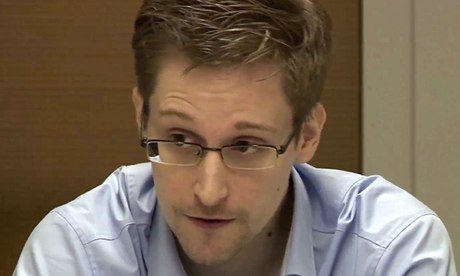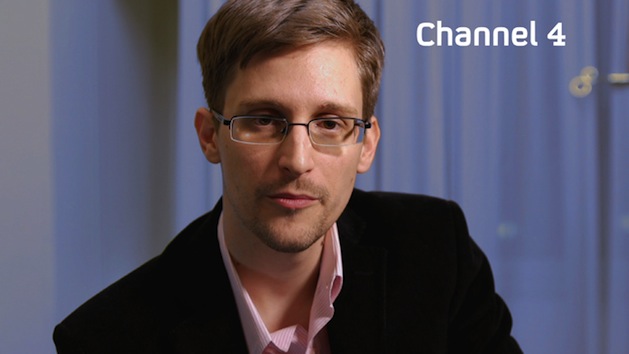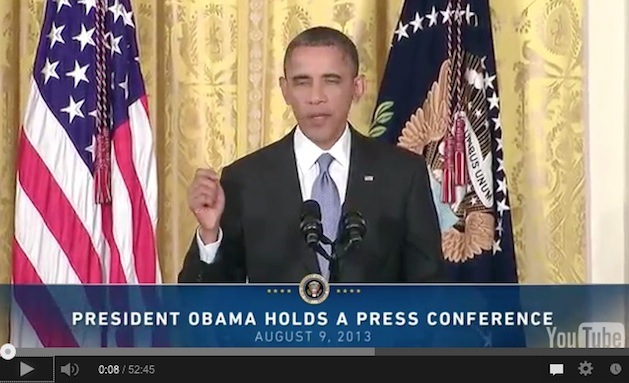Twenty-five years after the world wide web was created, it is now caught in the greatest controversy of its existence: surveillance.
Featuring interviews with the inventor of the world wide web, Sir Tim Berners-Lee, and the co-founder of WikiLeaks, Julian Assange, Horizon delves inside the 'dark web'.
Sweden will soon hold the Stockholm Internet Forum to discuss global development and global surveillance. The forum will open on 26 May and will be held in the famed Stadshuset, site of the annual Nobel banquet. The motto of the conference will be 'Internet Freedom for Global Development'.

Originally published at Mother Jones 30 April 2014.
A year ago there was no way I could have imagined being here, being honored in this room. When I began this, I never expected to receive the level of support that I did from the public. Having seen what happened to the people that came before, specifically Thomas Drake, it was an intimidating thing. I'd realized that the highest likelihood, the most likely outcome of returning this information to public hands would be that I would spend the rest of my life in prison. I did it because I thought it was the right thing to do.
Russian president Vladimir Putin's annual live Q&A marathon today had a surprise guest: Edward Snowden.
Snowden, piped in via videolink, asked Putin point blank if Russia had any mass surveillance system comparable to that of the NSA.
See the clip below to hear Putin's answer.
The Pulitzer Board have awarded their Public Service Award to the Guardian (US) and the Washington Post for their coverage of the NSA revelations by Edward Snowden. The decision, reportedly the subject of some controversy amongst the 19-member Prize Board, echoes their 1972 prize given to the New York Times for Daniel Ellsberg's 'Pentagon Papers'.
In response to revelations on NSA/GCHQ spying on WikiLeaks, WikiLeaks Editor Julian Assange released the following statement.

Hi, and Merry Christmas. I'm honored to have the chance to speak with you and your family this year.
Recently, we learned that our governments, working in concert, have created a system of worldwide mass surveillance, watching everything we do.
NSA whistleblower Edward Snowden, currently living in Russia, has agreed to cooperate with Brazil in investigating the actions of the notorious US signals surveillance agency, and is asking political asylum from Brazil in return.

Six months ago, I stepped out from the shadows of the United States Government's National Security Agency to stand in front of a journalist's camera.
I shared with the world evidence proving some governments are building a world-wide surveillance system to secretly track how we live, who we talk to, and what we say.
I went in front of that camera with open eyes, knowing that the decision would cost me family and my home, and would risk my life. I was motivated by a belief that the citizens of the world deserve to understand the system in which they live.
Wednesday 6 November 2013, 18:30 CET
As a journalist I have spent the last four months with NSA whistleblower Edward Snowden and arrived in Germany over the weekend. I worked in Hong Kong as part of the WikiLeaks team that brokered a number of asylum offers for Snowden and negotiated his safe exit from Hong Kong to take up his legal right to seek asylum. I was travelling with him on our way to Latin America when the United States revoked his passport, stranding him in Russia. For the next 39 days I remained with him in the transit zone of Moscow's Sheremetyevo airport, where I assisted in his legal application to 21 countries for asylum, including Germany, successfully securing his asylum in Russia despite substantial pressure by the United States. I then remained with him until our team was confident that he had established himself and was free from the interference of any government.
NSA whistleblower Edward Snowden met with German Green Party MP Hans-Christian Ströbele on 31 October regarding his being a witness for a possible investigation into NSA spying in Germany.
Edward Snowden has issued a statement to the Huffington Post regarding confusion about his current situation, and Julian Assange has spoken with Australia's The Age in the same vein.
On Friday 9 August 2013, US President Barack Obama addressed the world through a live feed at the White House website. Several topics were discussed, but the main topic - the obvious reason for the address - was of course the revelations about illegal NSA surveillance programmes. Today Julian Assange responds.

Harper's published an insightful interview with Glenn Greenwald yesterday on the evolving PRISM story. It's very much worth a read.
Gordon Humphrey served in the US Senate for 12 years and was a member of the Foreign Relations Committee, the Armed Services Committee, and the Judiciary Committee. The exchange below was shared with Glenn Greenwald.
Germany, Britain, Sweden: these countries and more have been "in bed" with the NSA for a long time, according to whistleblower Edward Snowden and Rick Falkvinge.
Sweden used a veto to stop the EU from asking critical questions of the US about the superpower's extensive espionage programme, a matter the Swedish media chose to not report to their readers.
Sweden and the UK have blocked talks between Europe and the US on the surveillance scandal. The talks, due to begin Monday, will now be limited to the more abstract issues of privacy and PRISM. A second working group, to be set up to confront the US with the most recent developments, had the support of the entire EU save Sweden and the UK, who both used their veto to prevent its formation.
Theme by Danetsoft and Danang Probo Sayekti inspired by Maksimer